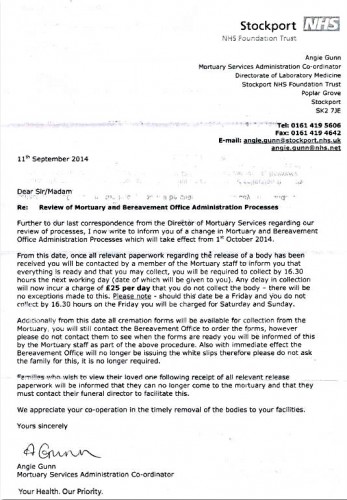Posted by John Bradfield
ED’s note: John Bradfield, founder of the Alice Barker Trust and author of the groundbreaking Green Burial, the DIY Guide, campaigns, together with Teresa Evans, for the legal rights of the bereaved. Here he argues that Richard III was illegally exhumed. He presents this argument in the context of his and Teresa’s wider campaign against the destruction of countless graves permitted by the granting of what they argue are legally invalid exhumation licences.
Response to information displayed on the Law & Religion website here.
David Pocklinton’s perspective on exhumation law is a very familiar one. I would like to present another.
David gives the impression, that an exhumation licence must be obtained in all circumstances, unless some other aspect of statute law applies, or a Church of England permission known as a faculty is necessary. The latter only applies to land which has been and remains, legally consecrated by the Church of England. There is also the power of a coroner to exhume but only under statute law and only for the purpose of investigating the cause of one or more deaths.
David’s perspective is both right and wrong. It is correct in that there are different sorts of permissions, depending upon the circumstances. It is wrong, in the sense that there are some properties, for which no permissions can be issued. That is so, unless it is possible to obtain a common law consent to exhume – presumably from a court. I have never found evidence of such a consent, from any time in the past.
When no statute law applies but exhumations still go ahead, they are illegal under common law and there is no time limit in which to prosecute. I submit, that on the basis of the limited information available about the land in which Richard III was buried, his exhumation must have been illegal, because the licence was unlawful and therefore invalid. If that is so, then his remains were illegally obtained by the archaeologists and they cannot have lawful “custody and possession of (his) remains”.
This crucial element of the legal picture was not put to the judicial review in the case of Elzbieta Rudewicz. It was presented to the Court of Appeal in a written witness statement but not discussed, analysed or pronounced upon. It was submitted by the Alice Barker Trust to the UK Supreme Court but there is no evidence of it having been considered or analysed.
I also submit that a judicial review could do more than consider questions of administration law, in terms of how the Ministry of Justice arrives at decisions to issue exhumation licences. A judicial review would, given a fuller and more accurate picture of law, start at the beginning and work forward. Then, the first question for a judicial review must be, “Is it possible to issue a lawfully valid exhumation licence for the type of property in question?”
As that question has never been considered by any court in the case of Elzbieta Rudewicz, a further appeal should be granted but is that still possible?
A complaint needs to be lodged with the UK Supreme Court. To that end, those involved would appreciate any pro bono help, in having the true legal position examined with greater precision by the courts. That is necessary in the national interest, because the case of Elzbieta Rudewicz contradicts long established case law, which was not considered, amended or overturned. The outcome thus far is so confused, that contradictory decisions on legal matters may all be valid or invalid, as no-one could be sure one way or the other.
One answer is for the police to pursue a common law prosecution over the exhumation of Richard III. He would then have the legacy of having served the national interest after death, by having stopped the outrageous and illegal destruction of graves created within living memory, despite protests from bereaved friends and relatives. Such a prosecution would finally stop civil servants issuing other legally invalid exhumation licences.
The police are unlikely to intervene, not least as the government negligently or unwittingly condones and even encourages some forms of criminality, through decisions taken by public services. They confidently act in the knowledge that they do so with total impunity and that is unlikely to change.
The provision of invalid exhumation licences, has resulted in the criminal destruction of graves and gravestones over decades. Since its inception in 1948, the NHS has never put a stop to the criminal detention of bodies in hospitals, after bereaved relatives and others have attempted to arrange collections.
What’s wrong with dying? Part of the answer is that decision makers are not asking the right questions. Is there a Parliamentary Select Committee which could and should examine these and related issues around death and bereavement?
For more details on exhumation law, see the Moonfruit website provided on behalf of the Alice Barker Trust here.
John Bradfield.
Writer on bereavement law.


